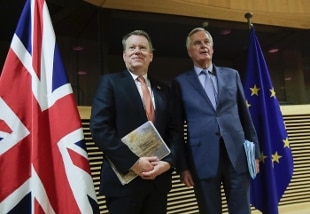Brexit: from 1 January 2021 new rules for moving to the United Kingdom
Brexit.
Michel: "For an agreement it takes two. Or it's no deal"
Share
04 December 2020The negotiations on the post-Brexit trade agreement between the UK and the European Union have been "put on hold" because "there are no conditions for an agreement". After a week of intense negotiations in London, Michel Barnier and David Frost, respectively EU and British chief negotiator, broke the news.
"Significant" divergences on governance, fishing and the so-called level playing field, so the negotiators agreed to suspend the negotiations and pass the ball to the leaders: Barnier and Frost will update their managers on the state of the negotiations and on Saturday afternoon they will discuss them directly the president of the EU Commission, Ursula von der Leyen, and the British Prime Minister, Boris Johnson.
The specter is that of the no deal: if an agreement is not reached by December 31, the trade relations between the parties will be regulated by the rules of the World Trade Organization (WTO), which would imply the introduction of taxes on imports. That the negotiations were at a "difficult point" had been made explicit a few hours earlier by the British Minister for Economic Affairs. He had made it clear that London is "committed to reaching an agreement" before the end of the transition period, scheduled for December 31, "but obviously time is running out and we are in a difficult phase. It cannot be denied". After a busy week of negotiations, resumed following the stop due to a case of Covid-19 in the staff of the chief negotiator for the EU Michel Barnier, a series of problems remain on the table that Downing Street defines as "delicate" and which "must yet to be resolved ", including state aid to companies and fisheries.
To complicate the picture, then, France intervened, which said it was ready to veto if the agreement reached was not satisfactory for its own economic interests. Fishing is particularly important for Paris, which most of all would like an agreement with London, but without giving in to compromises. "If there was an agreement and it didn't go well we would oppose it," Clement Beaune, the undersecretary responsible for European affairs, told radio Europe 1. "France, like all its EU partners, has the right of veto". The President of the European Council Charles Michel called for unity, underlining that it is true that the deadlines have not been met, but that the negotiations are still ongoing. Michel reiterated that it is in Brussels' interest to reach a trade agreement but that this cannot happen "at any cost". The same position was reiterated by the German government, which holds the rotating presidency of the EU Council.
Meanwhile, on Monday the UK House of Commons will vote on the controversial Internal Market Bill, a bill that gives the UK the power to violate parts of the withdrawal agreement legally reached with the EU last year, and which was condemned. from Brussels, US president-elect Joe Biden and even some conservative parliamentarians. The House of Lords removed clauses that violated the Brexit deal but the government has anticipated that it will ask the House of Commons to reinstate them. A move that could intensify the tension between Brussels and London by putting an end to the hope of reaching an agreement.

